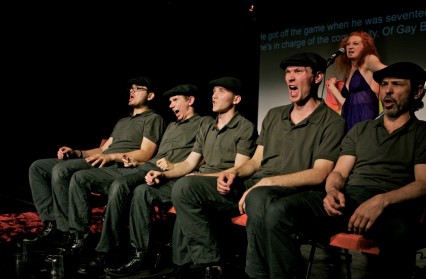Bethan James takes a look at Minsk, 2011: A Reply to Kathy Acker, the latest production from the Belarus Free Theatre.
It is easy to see why Minsk, 2011: A Reply to Kathy Acker won the Fringe First Award last year. A powerful blend of the personal and the political, this is raw and innovative theatre.
Devised as a companion piece to New York in 1979, it is based on a text by punk writer Kathy Acker which investigated the development of society through the prism of sexuality. Performed by actors from Belarus Free Theatre and set in the eponymous capital city of Belarus, Europe’s last dictatorship, Minsk 2011 is a provocative celebration of sexual expression. Many members of the revolutionary theatre company have been imprisoned, lost their jobs, or forced into exile, and this is certainly a defiant and rebellious production.

Devised by Belarus Free Theatre
Adapted and directed by Vladimir Shcherban
Co-Produced by Natalia Kaliada and Nicolai Khalezin
Through a fusion of theatre, dance, performance art, video installation and even folk songs, the memories of the city are brought to life by the talented performers. Many scenes are based on true stories from 2011: prostitutes sentenced to hard labour for their “crimes” are forced to clear the snow off Minsk’s streets in the harsh Winter. A young actor’s first experience of detention. A fatal bombing in Minsk’s Subway. These heartbreaking events pulsate with life.
The recurring theme of sexuality culminates in a mesmerising moment where a woman strips naked, is covered in ink, and “printed” on paper. It recalls a teenage girl’s experience of having her prints taken by police while detained in Minsk. By cataloguing her in this way, the authorities were trying to turn her into a mere object and dehumanise her. But she symbolically tears the paper, asserting her identity and the power of her own body.
Minsk 2011 is a performance of contrast and contradictions. At times this was a touching love letter to Minsk, at others it was more like a “sext” — provocative and tantalising. Minsk is both a lament for a repressive city that has lost its way and a daring tribute to the freedom that can be found there through sexual expression. The city itself feels like a seductive character in its own right.
Despite being an impressive and engaging production, Minsk 2011 was not without flaws. At times I felt the production was “over dressed”. I would like to have seen a few more moments when the actual stories were centre-stage and allowed to speak for themselves, instead of sometimes being over-shadowed by the (albeit impressive) action on stage. Moments of simplicity and silence were powerful but under-used.
Ultimately, the audience is left with a faint trace of hope for Belarus. Near the end, one character observes that when winter comes in Minsk snow falls and covers the city, hiding all that went before it. A blank canvas and a fresh start.
But a final thought: if I was in the dictatorship Belarus now I would probably be put in prison just for writing this review.











